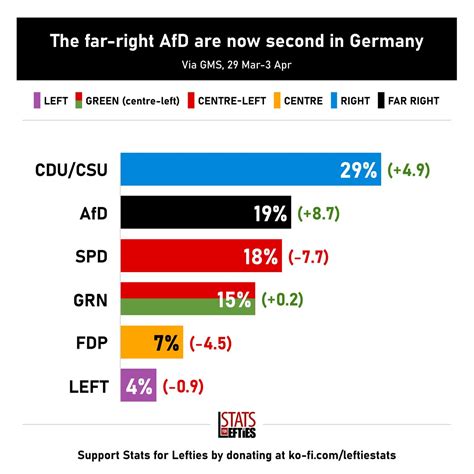In the heart of Europe, a storm is brewing in the political landscape of Germany. The winds of change are blowing as the Alternative for Germany (AfD) party makes significant strides, catching up to the long-standing Christian Democratic Union and Christian Social Union (CDU/CSU) alliance in recent polls. This unexpected turn of events has sent shockwaves through the country’s political establishment, signaling a potential shift in power dynamics.
A New Contender Emerges
The rise of the AfD marks a significant departure from the traditional dominance of the CDU/CSU alliance in German politics. Founded on anti-establishment sentiments and right-wing ideologies, the AfD has steadily gained traction by tapping into voter dissatisfaction with mainstream parties. With its populist rhetoric and focus on immigration and national identity, the party has successfully carved out a niche for itself within Germany’s political landscape.
The CDU/CSU’s Dilemma
For decades, the CDU/CSU alliance has been synonymous with stability and continuity in German politics. However, recent years have seen growing discontent among voters over issues such as immigration, economic inequality, and social welfare. The rise of the AfD reflects this disillusionment with traditional politics and poses a formidable challenge to the established order.
Implications for Merz
Friedrich Merz, one of the key figures within the CDU known for his conservative stance and business acumen, now faces an uphill battle to maintain his party’s supremacy. The latest poll results indicating parity with the AfD have dealt a blow to Merz’s leadership ambitions and underscored the shifting allegiances within German society.
Expert Analysis
Political analysts suggest that these poll results are indicative of broader trends sweeping across Europe – a growing wave of populism and nationalism that challenges established norms. The resurgence of right-wing parties like AfD underscores deep-seated anxieties around globalization, multiculturalism, and governance. As Germany grapples with these internal divisions, it stands at a crossroads that could redefine its political landscape for years to come.
As election season looms on the horizon, all eyes are on how traditional parties like CDU/CSU will navigate this new political terrain. Will they adapt their strategies to address voter concerns or face further erosion of their support base? Only time will tell how this clash of ideologies plays out in shaping Germany’s future direction.
The echoes of change reverberate through Berlin as rival factions prepare for what promises to be a fiercely contested electoral battle. In this era of uncertainty and upheaval, one thing remains clear – Germany stands at a critical juncture where every vote counts towards determining its destiny amidst evolving political currents.

